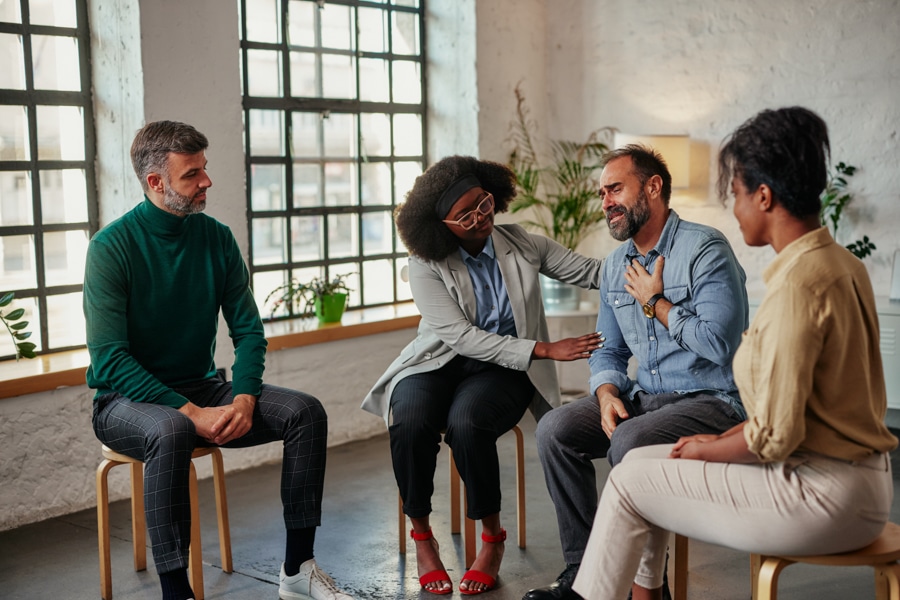Group Therapy for Substance Abuse in California
Group therapy not only provides an outlet for those in treatment to share what they are going through and learn new, and healthy ways to deal with some of their stressors and triggers successfully, but it also offers a support group, something many are missing, especially early on in the recovery process.
At Laguna Shores Recovery in Orange County, California, we offer group therapy for substance abuse to help people receive the support they need during the challenging recovery process.
The goal of group therapy is to provide a safe and supportive environment for participants to discuss their experiences, share insights, and work toward recovery collectively. Since everyone participating in group therapy is there for similar reasons and with the same goal in mind, it encourages everyone to come together to achieve those goals.

Seek Individual Therapy at Laguna Shores Recovery
How Does Group Therapy Work?
Group therapy sessions typically consist of a small group of individuals, often between 6 to 12 participants, who meet regularly. These sessions may be led by one or more therapists or counselors who facilitate the discussion and activities. The primary aim is to create a space where participants can openly express themselves, provide and receive support, and learn from one another.
Group therapy sessions often fall into one of the following categories:
- Fixed – The same group stays together from beginning to end with no new members being added.
- Revolving – People can come and go as they please
- Time-limited – Members will be required to attend each session for a specific length of time. Additionally, they will be asked to attend a specific number of sessions.
- Ongoing – No time limits or session limits required
Be Brave. Get Help.
Types of Group Therapy for Substance Abuse
Below are some different types of group therapy that are effective for treating substance abuse:
12-step groups follow a structured approach based on the 12-step recovery model. Common examples of a 12-step group include Alcoholics Anonymous and Narcotics Anonymous.
Cognitive behavioral therapy (CBT) groups incorporate the same CBT principles that are utilized during individual therapy sessions in orange county. CBT groups focus on identifying and changing negative thought patterns and behaviors associated with addiction, albeit in a group setting.
Psychoeducation groups are used to provide education and information regarding general themes of substance use, mental health, related behaviors, and the consequences of these behaviors.
Skills development group sessions help participants acquire essential life and coping skills such as:
- Stress and anger management
- Communication
- Relapse prevention
- Relaxation techniques
Process groups tend to dive into personal experiences, emotions, and underlying issues contributing to addiction. These group sessions tend to be less structured while also fostering relationships that can continue outside of therapy.
Often peer-led, support groups are meant to provide a safe and supportive space where participants can talk about things going on in their life, either directly related to addiction and recovery or not. Conversations and topics are often centered around day-to-day life and can help foster support for those in need.
Benefits and Goals
Benefits of Group Therapy for Substance Abuse
Participants can relate to one another’s experiences, reducing feelings of isolation and fostering a sense of belonging. They also may be able to provide advice if they have gone through the same or a similar experience
Group members hold each other accountable for their actions, helping to maintain a commitment to recovery.
Different backgrounds and viewpoints contribute to a rich learning experience and provide various coping strategies.
Group therapy equips participants with valuable skills for managing triggers, stressors, and cravings.
haring experiences in a non-judgmental environment reduces the stigma associated with addiction.
Goals and Principles of Group Therapy
Participants are expected to maintain confidentiality within the group to create a safe environment for sharing. To provide a welcoming environment where people are willing to share, it is important to maintain confidentiality.
With group therapy, you only get out what you put in. Engaging in discussions and activities is encouraged to maximize the benefits of group therapy.
Group members offer empathy, understanding, and support to one another.
Participants respect each other’s boundaries, opinions, and personal journeys. It’s this mutual respect that allows everyone to feel comfortable truly opening up.
Setting and working towards recovery goals is a fundamental aspect of group therapy.
How Is Group Therapy Helpful in Drug and Alcohol Addiction Recovery?
Group therapy can be helpful for those struggling with substance abuse and addiction in several ways including:
Participants can identify triggers and develop strategies to prevent relapse with the help of the group.
Regular group meetings help individuals stay accountable for their sobriety and progress in recovery.
Encouragement from peers can boost motivation and commitment to recovery.
Group therapy provides a safe environment to practice healthy social interactions and communication.
Group members can learn from one another’s successes and setbacks, gaining valuable insights.
Importance of Support During Recovery
This is one of the many reasons why group therapy is so important, especially during the early stages of recovery. Group therapy offers a unique form of support by connecting individuals with shared experiences in a way that allows everyone to be part of a support system for each other.
While group therapy is a great way to form a support system, it’s also important to remember that it’s not the only form of support available. Support can also be found through individual counseling and community resources, in addition to turning to friends and family should that be an option.
The combined support from various sources can significantly increase an individual’s chances of achieving and maintaining sobriety.
How To Find the Right Addiction Counselor or Group Therapy Session
How to Deal With Cliques in Support Groups
A great and easy way to find an addiction counselor or group therapy meeting is to simply talk to your doctor or a healthcare professional. They can often provide recommendations and guidance on treatment options.
You can also search for addiction treatment centers, clinics, or therapists specializing in substance abuse treatment in your area. Many treatment centers in California offer group therapy programs.
Many support groups and therapy sessions offer open meetings, allowing you to get a feel for the group dynamics before committing.
In some cases, online group therapy sessions may be a convenient and effective alternative.
Once you have found a therapist or facility to attend group therapy sessions, make sure that the therapist or counselor leading the group is licensed and has experience in addiction treatment.
Remember that finding the right fit may take some time, and it’s essential to choose a therapist or group that aligns with your goals and preferences.


 Matthew Beck B.A, M.A, LMFT
Matthew Beck B.A, M.A, LMFT 


